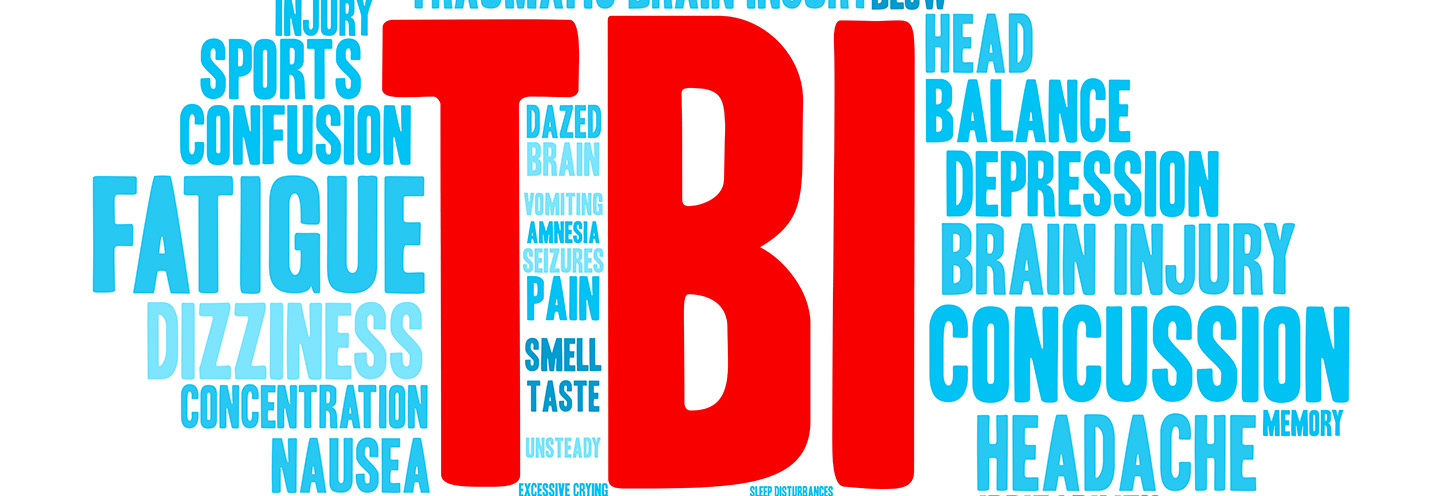Traumatic Brain Injury – A Traumatic Brain Injury (“TBI”) is an injury from the brain being damaged as a result of an accident, a fall, or a sports related injury to the head. Many people who have a Traumatic Brain Injury experience cognitive changes, communication difficulties, swallowing problems and other difficulties.

Traumatic Brain Injury (TBI)
SYMPTOMS
- Communication impairments may affect the ability to speak, and / or the ability to understand and express language. In addition to communication impairments, an individual may also have cognitive impairments which affects thinking skills necessary to complete simple daily activities.
- An individual’s ability to speak clearly and fluently can be caused by a variety of speech disorders resulting from a TBI. These include:
- Apraxia of Speech: A motor speech disorder that makes it difficult to initiate speech due to discoordination. A person with Apraxia may experience difficulty producing desired sounds / words, difficulty with imitating sounds / words, and be able to say something currently consistently.
- Dysarthria: A motor speech disorder that causes slurred speech due to muscle weakness. A person with Dysarthria may have slurred speech, be difficult to understand, speak slowly or too fast, vocal changes, difficulty with moving lips / tongue / jaw and with coordinating breathing / speaking.
- Fluency / Stuttering: May result from a TBI causing dysfluencies in speech, repetitions of words and prolongations.
- Voice: A person may experience vocal changes following a TBI causing the voice to sound more breathy, hoarse or weak. These changes could be related to Dysarthria or vocal fold paralysis.
- An individual’s ability to understand and express language can be affected due to language disorders resulting from a TBI. These include:
- Receptive Aphasia: A language disorder that affects the ability to comprehend language. There are different types of Receptive Aphasias and the severity of the impairment depends on the depth of brain damage. However, in general, an individual whose receptive language is affected may have difficulties with understanding spoken / written language, following simple directions, identifying words / pictures, difficulties with written instructions or reading comprehension.
- Expressive Aphasia: A language disorder that affects the ability to speak and express language. There are different types of Aphasias that can affect the ability to communicate. These may include difficulties with naming objects / pictures, producing grammatically correct sentences, repeating words / phrases or speaking in short phrases.
- The ability to read and write can also be affected by Aphasia.
- An individual may have difficulties with eating and drinking resulting from a TBI. This is known as Dysphagia.
- Dysphagia is a swallowing disorder that can be caused by a TBI. An individual with Dysphagia may suffer from weakness of the oral muscles (lips, tongue, jaw) and experience difficulties with chewing food and / or clearing it out of the mouth. Additionally, people may experience frequent coughing and choking while eating and drinking due to weakness of the throat muscles. This can lead to other serious medical conditions including dehydration, malnutrition and Pneumonia, if untreated.
- An individual may experience cognitive changes unrelated to language impairments resulting from a TBI. Depending on which areas of the brain are affected as a result of the TBI, the following areas of cognition may become impaired:
- Problem Solving / Reasoning
- Memory
- Attention
- Executive functioning
- Orientation
- Judgment
- Insight
HOW WE CAN HELP
- At Q Enrichment Center, our Speech, Language and Swallowing Pathologist will conduct an extensive comprehensive assessment to determine the type of difficulty, the severity, as well as the diagnosis. A detailed report will be completed along with a treatment plan specific to each individual’s needs.
